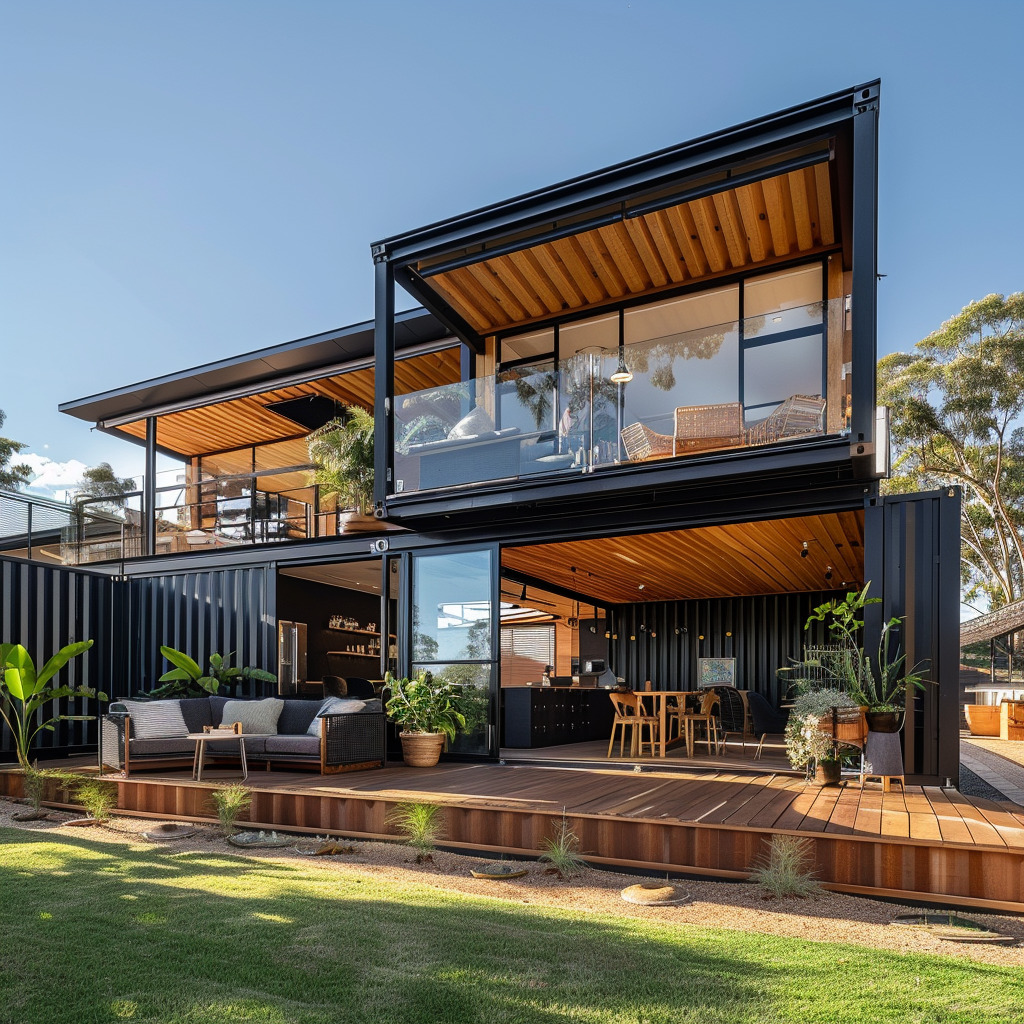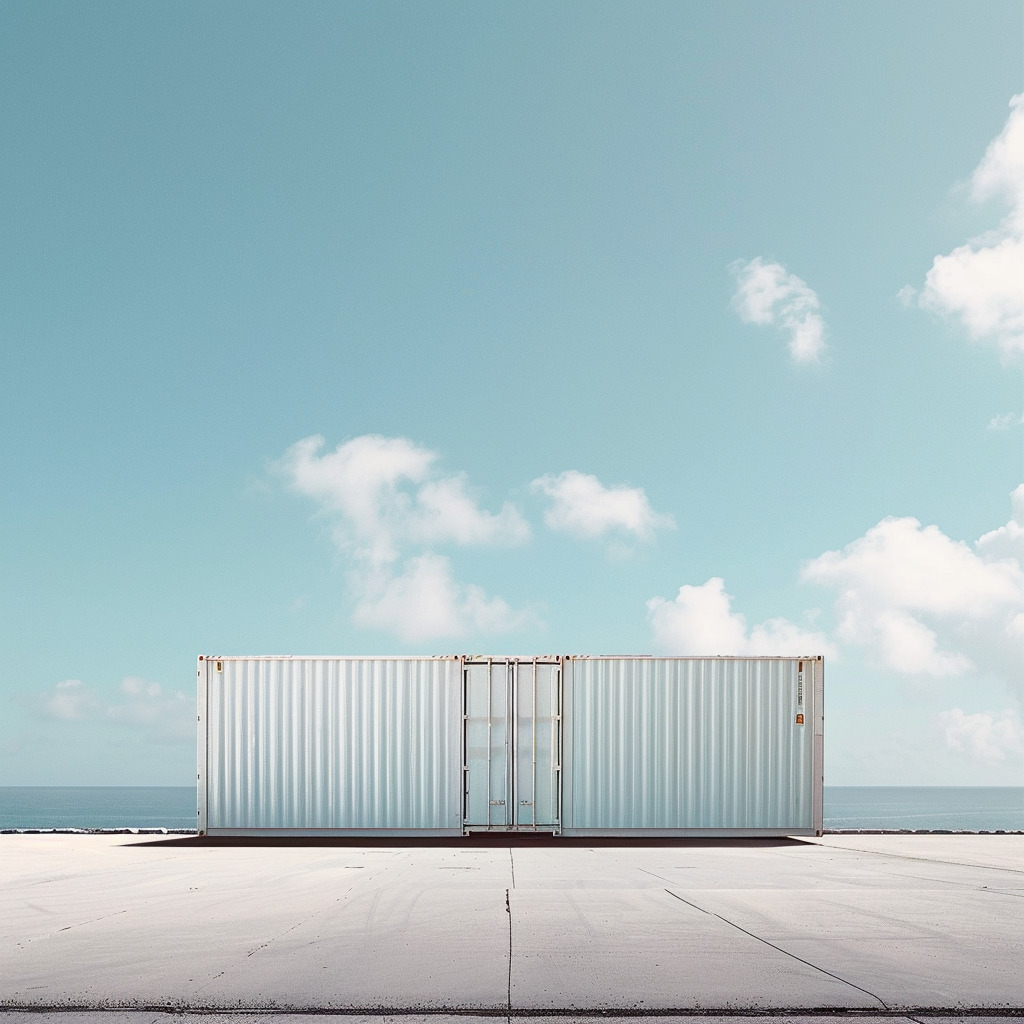Here at Gateway Gazette we often look at shipping container home conversions, but now for something a little different – shipping container shops. As with their housing equivalent, shipping container conversion shops benefit from their low initial cost and that they can be shifted from place to place.
In some cases, for the new shop owner they can speculate on the success of the business by selling different things to test their business idea. This means they don’t necessarily have to enter into a long term lease that they would have to pay regardless of the success of their business. In this blog post we will look at several examples of shipping container shops, including a UK portal shipping container shop, from which shoppers can buy wine and have it delivered to their homes, and a mobile shopping boutique in the US.
Mobile pop up shops

Two businesses in Canada and the US have developed a mobile shop idea. The first is Le Popup based in Alabama in the Deep South of the US. Partners Dirk Dominick and Westcott Shaw both enjoy travel, with Dominick having owned a home in France many years ago. The concept came to the couple that they could explore France both on business and for fun, with the business paying for their travel between the US and France, and while getting to know the country, importing goods to Alabama that people just wouldn’t find anywhere else.
Dominick said, ”During my travels, I was constantly finding products that I thought would sell well in the States. The idea of importing has always appealed to me so by the time we were ready to pull the trigger, I had a pretty big list of unique products to look into.”
The idea for a container based shop allows them to set their business down for a short period in the car park of another business, trade for a few days, and then up sticks and move onto another location. The shipping container’s mobility is a very important factor in this, as it can be put on a truck and moved on.
The shipping container system also means they don’t have to enter into a lease contract and in some parts of the world, pay business rates for their permanent business. This keeps their business expenses largely down to their travel to Europe and paying for their semi business / semi pleasure lifestyle.
The concept requires minimal investment beyond the $3,000 – $5,000 for the converted container, and once you have agreed on a spot with one (or more) existing land owners you can get on with the business of selling the goods.
So far Le Popup has been a resounding success for Dominick and Shaw. They are actively planning on giving up their ‘day jobs’ and moving into full time importing and selling their goods around the state.
In Canada meanwhile a company has come up with a similar idea only for selling high end men’s clothing. Working with Needs & Wants Studios, the business owners have converted a 40ft shipping container into a slick boutique.
The container’s inside is lined with wood to give the movable store a sense of style inside, and within there is a one way mirror for the customers to get a feeling of space inside, while those outside cannot see in.
This container shop opens at both ends, adding to the sense of spaciousness but also allowing people to enter or leave from both ends.
A very important aspect for the fashion shop owners is that it can be moved from place to place. While the boutique was photographed Ontario, Canada the boutique owners planned to have it shipped to various trendy shopping districts across the border in New York City. For the brand, the mobility is important so they can reach greater numbers of discerning customers and thereby expand their customer base. In this case, the store can be moved between locations that would ordinarily cost so much in ground rent that it would kill off many smaller startups that take the leap into renting stores in similar prime shopping locations.
Shipping containers’ low initial outlay means that the owners can minimise their running costs and maximise their profits from their concept at the same time. Startup businesses are often killed off by their running costs and as such the container idea is a very good move for those experimenting with their idea.
Shipping container store – not just for the little guys…

European discount grocery chain Aldi sells 24,000 bottles of wine a day from its Exquisite Collection in the UK alone. It was made Multiple Wine Retailer of the Year in 2015 by the UK Drinks Retailing Awards and Quality Drinks Retailer of the Year at the Quality Food and Drink Awards that year too. So what is a multibillion dollar company doing opening a shipping container based shop?
The answer is quite simple – reaching more customers! The grocer is so well known among the wine drinking community that by having a mobile shipping container wine store it can pop up in more locations and reach out to those curious to know more about their wine selling reputation.
This concept isn’t just a box with a stack of booze at the back though. The idea is a little slicker than that! Potential shoppers going inside will find a fully trained sommelier who can guide them through their choices of wine according to their budget and purpose of buying the wine. The first store even has a Wine Master who has such some of the greatest knowledge in the world and can guide the shopper through their choices.
The shipping container popup wine shop also runs wine tasting sessions through the day so passing trade can come in and taste what Aldi has on offer. As an insight, the most expensive wine in the world isn’t always the best – some at a lower price point can really give the more expensive stuff a run for its money and this is why choosing your booze can be such a minefield.
While some wine is in stock, the whole range of Aldi’s wines is available for home delivery. Once tasting and making their choice, shoppers can use tablets installed in the shipping container to order a case or two of their choice and this will be delivered the next day direct to their homes.
Shipping container shopping malls

Opening just in time for the Christmas shopping rush in Guildford, England, a new temporary shopping centre is being set up in a prime shopping location. The 30 x 40ft container shopping complex is being set up at the time of writing in the centre of the commuter town just outside of London. The area is owned by developers who have been planning to build a permanent shopping centre in the location, but the project has been beset with delays.
While the designs and plans for the permanent shopping centre carry on in the background, the local council has leased the land for two years to allow micro-businesses and popups to trade with local shoppers right in the centre of the town.
Ahead of the project’s construction, the North Street development had hundreds of enquiries from entrepreneurs but the council eventually set on 30 containers to start the project off. Not unlike an outdoor market the concept is there to help inject cash into the local economy and make some prime real estate economically active.
The council has stated that once the developers who own the site start building the permanent shopping centre, the shipping container shopping centre will be moved on to another site in the town to keep those businesses inside running. One councillor said of the project: “What we are hoping is that if this is successful, and we think it will be, then at the end of the term with M&G we can lift this up and put it somewhere else. I don’t see any reason why we shouldn’t do that.”
While many shipping container shopping malls around the world tend to be permanent affairs, this is a great concept that takes advantage of the central asset of a converted shipping container – that it can be moved around. Many towns and cities around the world have areas in their central business districts that are economically inactive for different reasons, yet by dropping converted shipping containers on the site can bring life back into the area and help local businesses by having an attractive site in a very busy location with lots of passing trade. For the council, businesses will pay local taxes so those renting units will pay for the project both in taxes and rent, making the investment a good business proposition.
Permanent shopping mall in Argentina
A 57 unit office space and shopping mall has just been set up in a town just an hour outside of the capital, Buenos Aires. The three storey construction has a number of businesses inside including shops, restaurants and office space.
It is lit with round, porthole windows and has a solar energy farm on its roof to help power the complex. Green roofs also insulate the building and add to its aesthetic appeal, making for somewhere people want to be. Local children have painted many of the external walls to add to the friendliness of the shopping mall, that serves the community of Mendoza 1667.
Those in the building can wander among the stores, and eat in one of a number of eateries and coffee shops. Access to the upper floors is either by external stairways or by elevator inside the complex.
The mall is not the first to have been built, and benefits from the relatively low cost of shipping containers as building units. The chief difference between this concept and that of the ones above is that it is a permanent structure and those operating their businesses will be in direct competition – and pay similar costs to – their competitors in similar units that are built of steel and concrete.
Want to start a shipping container pop-up shop?

If you have an idea for a shipping container shop conversion, come to us and our team of experts will gladly talk to you about what modifications we can make in our onsite workshop. We can also put you in touch with our network of builders and architects if your project is more ambitious. Here at Gateway Container Sales we have many years’ experience in providing shipping containers from residential accommodation, to storage units and yes, even for shops, so get in touch today!




